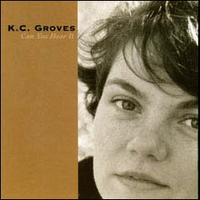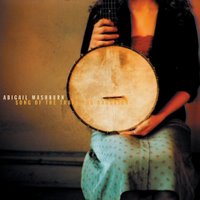 K. C. Groves is the one of the members of Uncle Earl, an all female bluegrass/old music band. Abigail Washburn, whose album I previously reviewed, is also a member of this group. I bought this CD at their concert, because out of all the very talented members, I was most impressed with Miss Groves. (As a side note, I now have a huge crush on her, so if you're reading this K.C., the contact info for the tall handsome guy at the back table is in my profile.)
K. C. Groves is the one of the members of Uncle Earl, an all female bluegrass/old music band. Abigail Washburn, whose album I previously reviewed, is also a member of this group. I bought this CD at their concert, because out of all the very talented members, I was most impressed with Miss Groves. (As a side note, I now have a huge crush on her, so if you're reading this K.C., the contact info for the tall handsome guy at the back table is in my profile.)Just kidding.
Anyway, live, Miss Groves sounds like Patsy Cline reincarnate. On her album she's a bit closer to Alison Krauss without the "I'm three years old" quality to her voice, but still really good. And she's a talented musician. On this album, she plays guitar and mandolin, and sings all the songs, which she wrote. Guest musicians include Tim O'Brien and Peter Rowan, so she's got some pretty good friends helping her out too.
The title track is a paean to old time music, with the repeating refrain "can you hear it, or is it just me?" She follows this with a few pensive ballads. Though by no means the most innovative lyricist, I was impressed with some of her poetry in these songs too. "You Think We're Friends" is rather clever at times, with the hook of the song being "you think we're friends/but I'm in love with you."
After several listens, the only song I'm not a huge fan of is "Pony Days" which is just a bit too cutsey. "I traded my ponies for new clothes and boys/and now that I'm older, I question that choice" is her theme here. What? No, thanks. Fortunately, the album picks up again from here and finishes strongly. The final track is a wistful reflection, with the best poetry on the album: "And the world turns around/The sun comes up and the sun goes down/questions abound/still the world turns around."
Like most albums, it is easy to find some fault with it. Unlike many, it rises above those faults to be a solid piece of work. Recommended.
The concert, as a whole, was amazing. Solid instrumentals, tight harmonies, Kristin Andreasson doing some clogging, and exceptional fiddle playing by Rayna Gellert. Abigail Washburn, whom I compared favorably to Emmylou Harris, has a bit of Mahalia Jackson in her as well. Most times, when a band is encored, they'll play a real rousing send-off to get everyone out on a high. But this one was different. Miss Washburn led an a capella call-and-response gospel tune titled "Keys to the Kingdom" and got the entire crowd singing the chorus. It was simply beautiful.
So if you're in an area where Uncle Earl is touring, go out and see them. You won't regret it.








